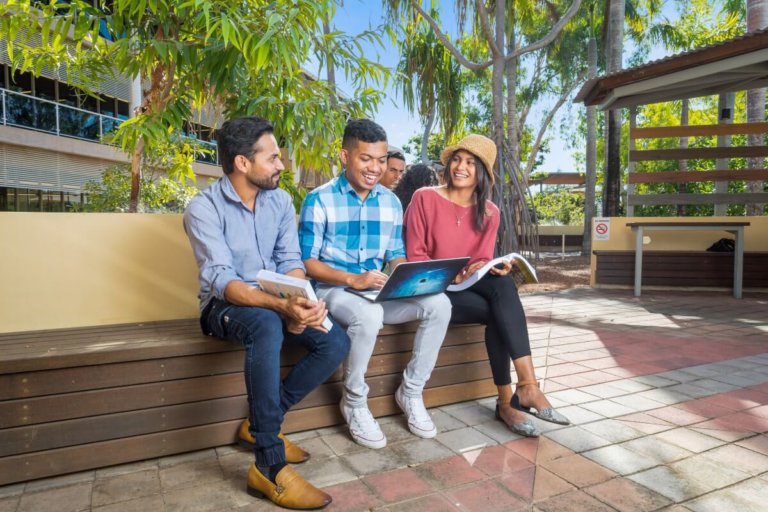
Charles Darwin University (CDU) is located in Darwin, Australia (with regional campuses across Sydney and the Northern Territory), offering a tropical climate with plenty of lush greenery and stunning natural surroundings.
This young university is known as a ‘New World’ university – where modern and innovative thinking is the driving force behind course structures and the university culture.
Industry-relevant courses prepare students for the future, granting them plenty of hands-on experience to increase and develop their practical knowledge.
They learn from industry experts and experienced researchers who also act as student mentors and supervisors.
This means students graduate career-ready, as CDU is one of five top Australian universities for graduate employment and salary outcomes, according to The Good Universities Guide 2019.
For those who want to truly make a difference and stand out from the rest, CDU equips you with knowledge and skills and teaches you how to use them in an impactful, meaningful manner.

Source: Charles Darwin University
Engaging courses tackling global human issues
Due to the school’s location, the university is well-equipped to offer courses pertaining to tropical health, environmental management and livelihoods, and emergency/disaster management.
For those pursuing Humanitarian, Emergency and Disaster Management programmes, you’ll learn how to approach disaster, emergency and community risks through a holistic approach.
Courses focus on issues in the Asia-Pacific (APAC), Africa, the Middle East and South America, while research is focused on sustainability and global issues, along with tropical health and environment.
As the university promotes hands-on learning, it offers ‘scenario’ training and placements with aid agencies, NGOs and government departments, all while students are taught by leading industry experts.
For example, Emma Kettle worked in the humanitarian aid sector for more than 15 years and subsequently enrolled in the Master of Disaster and Emergency Management at CDU to supplement her skills and keep up with the best new practices for tackling crises in this sector.

Source: Charles Darwin University
She was previously the Director of Capability at RedR Australia, a not-for-profit organisation that provides humanitarian response training and assistance to alleviate suffering in post-disaster and emergency situations, and is now running her own consultancy.
She said, “At CDU, I could tailor my Master’s degree to suit my professional needs and interests.
“I chose to specialise in cultural competency, which is a huge part of my job at RedR. I completed some fantastic units that taught me so much about how people understand, communicate and interact in culturally-diverse contexts.”
The diverse student population means that courses here suit different individuals from a wide range of backgrounds.
For example, there is the Graduate Diploma of Indigenous Policy Development programme which builds on students’ professional knowledge and experiences so they can gain an in-depth understanding of indigenous economic and policy development in Australia.
The niche programme provides those who intend to serve the indigenous community with an essential foundation for respectful and accountable engagement.

Source: Charles Darwin University
Learners also gain relevant knowledge on the current social and political issues faced in Australia and worldwide.
Students strengthen their knowledge by examining key issues of Indigenous policy development and implementation, economic development and participation, traditional and modern governance structures, and intellectual and cultural property rights in current social and political contexts.
Upon graduation, students can take on roles in government and non-government organisations that manage Indigenous affairs in areas such as research, policy development, or media and communications and academia.
Exciting hands-on learning opportunities
Those in the Science, Environmental Science & Management undergraduate course are able to take part in exciting intensive courses in the field, as well as hands-on laboratory and practical experience.
By studying science in a university that’s reputed for its impact on environmental research, students get to specialise in areas such as biodiversity and conservation, water and catchments, eco-cultural resource management, or landscape and spatial ecology.

Source: Charles Darwin University
Larissa Potter graduated from CDU with a Bachelor of Science with first-class honours. She was drawn to the university because of the opportunity to work in the Tiwi Islands through an honours project.
In her graduation speech, she said, “The project was to examine whether remote sensing cameras, or camera traps as we call them, could be used to survey for a small, elusive mammal found only on the Tiwi Islands.
“To me, it was the opportunity to work in an amazing part of Australia that I’d never been to, the Tiwi Islands, the chance to meet new people and create a wider professional network, to leap out of my comfort zone and become one of the few to hold a Butler’s Dunnart.
“I loved my project and study species, my supervisors Brett and Chris were fantastic, the members of the School of Environment, Research Institute for the Environment and Livelihoods (RIEL) and the postgrad society were very welcoming, and I thank you all.”
For students interested in furthering their careers in the field of Public Health, the postgraduate course equips students with the relevant knowledge to become leaders in public health and health research.
Here, you’ll gain the skills needed to interpret health information, including epidemiology, statistical analysis and qualitative research methods for social issues in Indigenous, local and global contexts.

Source: Charles Darwin University
You’ll do so by working side-by-side and learning from lecturers and research supervisors in Public Health research and practice.
Similarly, the Master’s programme in Public Policy allows students to build the necessary skills to engage in effective and ethical research for policy development, strengthening their understanding of the unique challenges that come with policy development in northern Australia.
Choose from specialist electives to further hone in on your areas of interest, such as indigenous policy, international education, governance and management, health, emergency and disaster management and environmental management.
Then, apply your knowledge to developing an important public policy research project on a topic of your choice.
Along the way, you’ll receive one-on-one supervision and support from university researchers, public policy researchers, policy developers and evaluators, and teaching staff.
Upon graduation, you’ll be able to work in government and private companies as a policy researcher, advisor, analyst or writer.
For those looking for an exciting and challenging educational experience in a progressive-thinking university, Charles Darwin University is the place to be.
Follow CDU on Facebook, Twitter, YouTube, Instagram, LinkedIn and Weibo
Liked this? Then you’ll love these…
Curtin Business School: Transforming careers from traditional to technological
La Trobe University: Building the next generation of cybersecurity professionals







